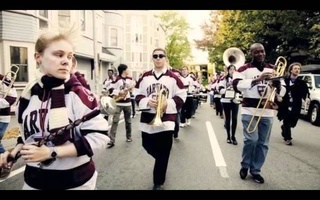Smith held leadership positions on the student council, Hodge said, and volunteered much of her time outside of class. She tutored younger students preparing for the SAT, served as a big sister in a mentoring program, and coordinated canned food drives.
Her service to her Harlem community did not stop after graduation. After her freshman year at Harvard, Hodge said, she collaborated with three high school classmates to establish a scholarship fund to help defray the costs of travel and textbooks for female seniors at Frederick Douglass headed to college.
Smith had made her way from Harlem to Harvard—and had found a way to bring the benefits of her new home back with her.
Smith’s Harvard classmate recalled that she often commented on the distinction between fellow black students from different socioeconomic backgrounds. Smith would speak disdainfully of those from ritzier parts of New York City and would complain that Harvard students were insensitive to the struggles of blacks and ignorant of the realities of life in poverty.
“It’s difficult to take someone that is into the street life and come to a college campus,” Hodge said.
He said that although Smith received a “phenomenal” education at Frederick Douglass and had even greater academic opportunities at Harvard, “for some reason or somehow, the young lady made poor decisions.”
II.
Ill at ease with several aspects of campus culture, Smith found in Copney, 22, someone with whom she shared a hometown. Copney, an aspiring songwriter, was also from Harlem. Beginning in 2008 the two forged an intense, at times rocky relationship that would contribute to their mutual downfall.
“We’re either like at a really good point or a really bad point,” Smith said in court in March 2011, when she affirmed that she and Copney were still dating. “We had disagreements about, yes, a lot of things.”
The classmate recalled noticing, “It seemed like going back and forth, complaining about him and other times in love with him.”
Friends of Smith note that she may have had cause to complain. Chanequa N. Campbell—one of Smith’s best friends and the other student who was not allowed to graduate from Harvard in the shooting’s aftermath—agreed with the prosecution’s description of Copney as “jealous” and “controlling” of Smith.
“They had a pretty tumultuous but passionate relationship. They were committed to each other,” Campbell said.
That commitment ran deep. Smith said that the two were “basically planning a future together.” By her senior year, they lived together in her Lowell single, said Cambridge Police Detective John W. Crowley in court.
But the relationship was still fraught with conflict.
According to Smith’s testimony in a hearing, Copney at one point ordered her to get rid of evidence, such as framed photographs and stuffed animals, of a relationship that ended about two years before she began dating Copney. She told Copney that she had thrown away the items. But in fact, she had stowed them under her blockmate’s bed—a spot she would later reuse as a hiding place when Copney asked her to conceal the murder weapon.
Recommended Articles
-
Last Kirkland Shooting Defendant Sentenced To 9 to 12 YearsBlayn Jiggetts, one of three men found guilty of the murder that took place in a Harvard dormitory two years ago, was sentenced to 9 to 12 years in prison.
-
 TOP 10 NEWS STORIES OF 2011
TOP 10 NEWS STORIES OF 2011 -
Kirkland Shooting Victim's Mother Sues HarvardThe mother of a 21-year-old man who was fatally shot in a Harvard dormitory three years ago claims that Harvard’s negligence in allowing a drug dealer to live in Lowell for months led to the wrongful death of her son.
-
Harvard Seeks To Dismiss Cosby Civil SuitFacing a lawsuit faulting the University and Lowell House administrators for the death of a 21-year-old man on Harvard’s campus in 2009, Harvard said in a legal filing last week that it cannot be blamed for the death of a non-student drug dealer who was killed during a transaction in Kirkland House.
-
An Unfounded LawsuitThough Lowell House administrators did show a marked neglect of Harvard’s policies in overlooking Copney’s presence in the House, Harvard cannot be held responsible for a crime upon which it had no proximate influence.
-
Attorneys Trade Arguments in Cosby Civil Suit HearingAs a judge heard arguments for the first time relating to B. Denise Cosby’s wrongful death lawsuit against Harvard for the 2009 murder of her son in Kirkland House, lawyers for Harvard said that the University cannot be held responsible for the drug deal gone wrong, and the suit should be dismissed.













